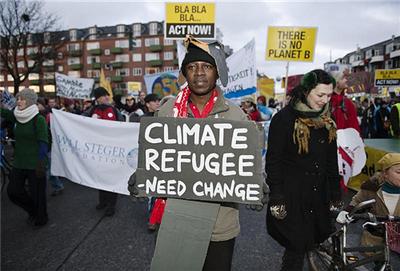 So the second week begins and it’s not looking good at all.
So the second week begins and it’s not looking good at all.
The Times newspaper reports that key decisions could be delayed for up to six years if the Copenhagen summit delivers a compromise deal.
The paper says that world leaders might only agree to reviewing cuts in 2015 or 2016.
Whilst everyone knows it will all boil down to China and the US, other politicians are now openly expressing concern at the slow nature of the talks.
David Miliband, Britain’s Environment Minister said: “We’re now getting close to midnight in this negotiation and we need to act like it. That means more urgency to solve problems, not just identify them, more willingness to shift from entrenched positions and more ambitious commitments. We’re not yet on track for the kind of deal we need.
Bernarditas Muller, lead negotiator for the G77 and China group of developing countries, said putting off the most difficult decisions on emissions cuts would be a betrayal of commitments made by rich countries under the UN Climate Convention.
“Developing countries have the most to lose if we do not agree a just and ambitious outcome in Copenhagen. We are simply asking developed countries, ‘Don’t shirk your responsibilities. Just do what you have already agreed to do under the Climate Convention’.”
But as if to prove a point about listening to the developing countries, many were excluded from a meeting yesterday of Environment ministers from about 40 countries.
Meanwhile, the business lobbies are out in force to try and get what they want. The largest lobby group in Copenhagen once again appears to be the International Emissions Trading Association (IETA), which is one of the nominees for the Angry Mermaid Award.
IETA had the largest non-government delegation at the UN climate talks in 2007 and 2008 – and Copenhagen looks to be no exception either. It has 486 people at the talks, including chief executive Henry Derwent.
The other big corporate lobby groups are there in numbers too. The International Chamber of Commerce has 136 people. So too is the European Round Table of Industrialists, the International Petroleum Industry Environmental Conservation Association and the World Business Council for Sustainable Development.
Specific industry sectors are there in force too. The airline industry- through the International Air Transport Association (IATA) has 36 representatives, including British Airways chief executive Willie Walsh and IATA director Giovanni Bisignani. And the European Chemical Industry Council (Cefic) has 28 delegates, including representatives from German chemical giant BASF, Dow Chemicals and Bayer.
More and more people will be arriving in town. By Friday about 120 Prime Ministers and Presidents will attend the final day of the summit on Friday. And with thousands of business lobbyists twisting their ears it is unlikely that any significant deal will be secured.
